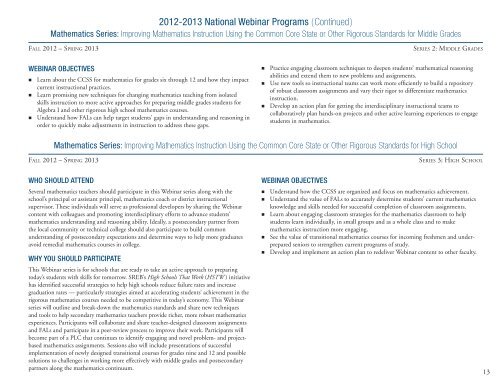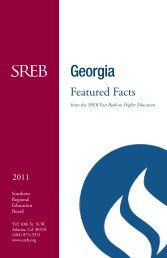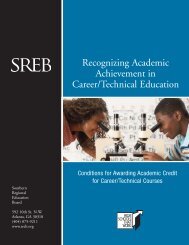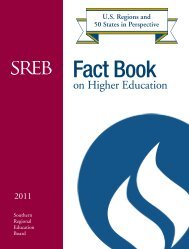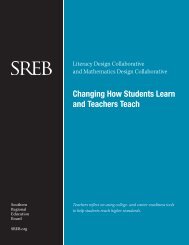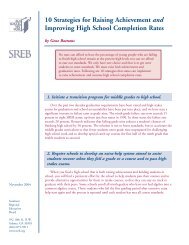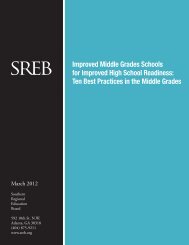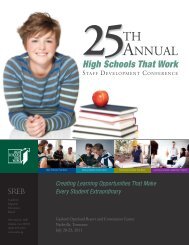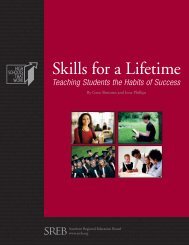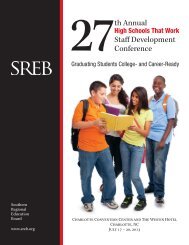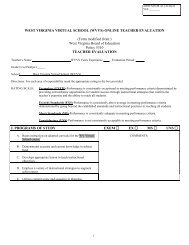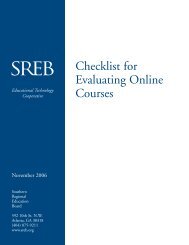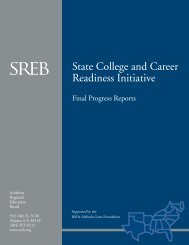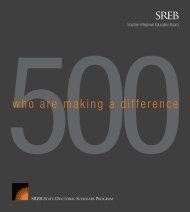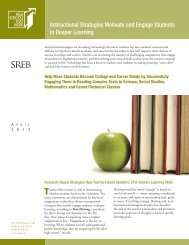2012-2013 National Professional Development Programs
2012-2013 National Professional Development Programs
2012-2013 National Professional Development Programs
You also want an ePaper? Increase the reach of your titles
YUMPU automatically turns print PDFs into web optimized ePapers that Google loves.
<strong>2012</strong>-<strong>2013</strong> <strong>National</strong> Webinar <strong>Programs</strong> (Continued)Mathematics Series: Improving Mathematics Instruction Using the Common Core State or Other Rigorous Standards for Middle GradesFALL <strong>2012</strong> – SPRING <strong>2013</strong>SERIES 2: MIDDLE GRADESWEBINAR OBJECTIVES• Learn about the CCSS for mathematics for grades six through 12 and how they impactcurrent instructional practices.• Learn promising new techniques for changing mathematics teaching from isolatedskills instruction to more active approaches for preparing middle grades students forAlgebra I and other rigorous high school mathematics courses.• Understand how FALs can help target students’ gaps in understanding and reasoning inorder to quickly make adjustments in instruction to address these gaps.• Practice engaging classroom techniques to deepen students’ mathematical reasoningabilities and extend them to new problems and assignments.• Use new tools so instructional teams can work more efficiently to build a repositoryof robust classroom assignments and vary their rigor to differentiate mathematicsinstruction.• Develop an action plan for getting the interdisciplinary instructional teams tocollaboratively plan hands-on projects and other active learning experiences to engagestudents in mathematics.Mathematics Series: Improving Mathematics Instruction Using the Common Core State or Other Rigorous Standards for High SchoolFALL <strong>2012</strong> – SPRING <strong>2013</strong>SERIES 3: HIGH SCHOOLWHO SHOULD ATTENDSeveral mathematics teachers should participate in this Webinar series along with theschool’s principal or assistant principal, mathematics coach or district instructionalsupervisor. These individuals will serve as professional developers by sharing the Webinarcontent with colleagues and promoting interdisciplinary efforts to advance students’mathematics understanding and reasoning ability. Ideally, a postsecondary partner fromthe local community or technical college should also participate to build commonunderstanding of postsecondary expectations and determine ways to help more graduatesavoid remedial mathematics courses in college.WHY YOU SHOULD PARTICIPATEThis Webinar series is for schools that are ready to take an active approach to preparingtoday’s students with skills for tomorrow. SREB’s High Schools That Work (HSTW ) initiativehas identified successful strategies to help high schools reduce failure rates and increasegraduation rates — particularly strategies aimed at accelerating students’ achievement in therigorous mathematics courses needed to be competitive in today’s economy. This Webinarseries will outline and break-down the mathematics standards and share new techniquesand tools to help secondary mathematics teachers provide richer, more robust mathematicsexperiences. Participants will collaborate and share teacher-designed classroom assignmentsand FALs and participate in a peer-review process to improve their work. Participants willbecome part of a PLC that continues to identify engaging and novel problem- and projectbasedmathematics assignments. Sessions also will include presentations of successfulimplementation of newly designed transitional courses for grades nine and 12 and possiblesolutions to challenges in working more effectively with middle grades and postsecondarypartners along the mathematics continuum.WEBINAR OBJECTIVES• Understand how the CCSS are organized and focus on mathematics achievement.• Understand the value of FALs to accurately determine students’ current mathematicsknowledge and skills needed for successful completion of classroom assignments.• Learn about engaging classroom strategies for the mathematics classroom to helpstudents learn individually, in small groups and as a whole class and to makemathematics instruction more engaging.• See the value of transitional mathematics courses for incoming freshmen and underpreparedseniors to strengthen current programs of study.• Develop and implement an action plan to redeliver Webinar content to other faculty.13


